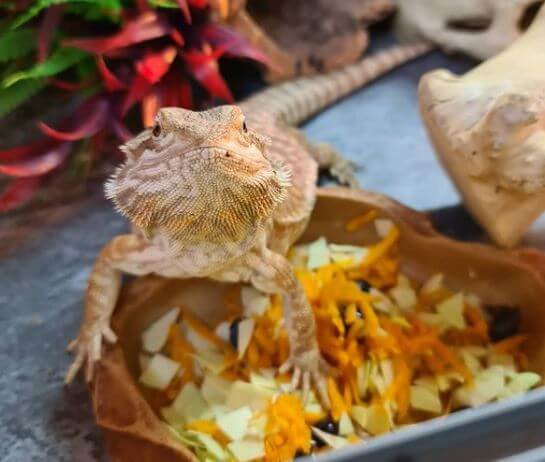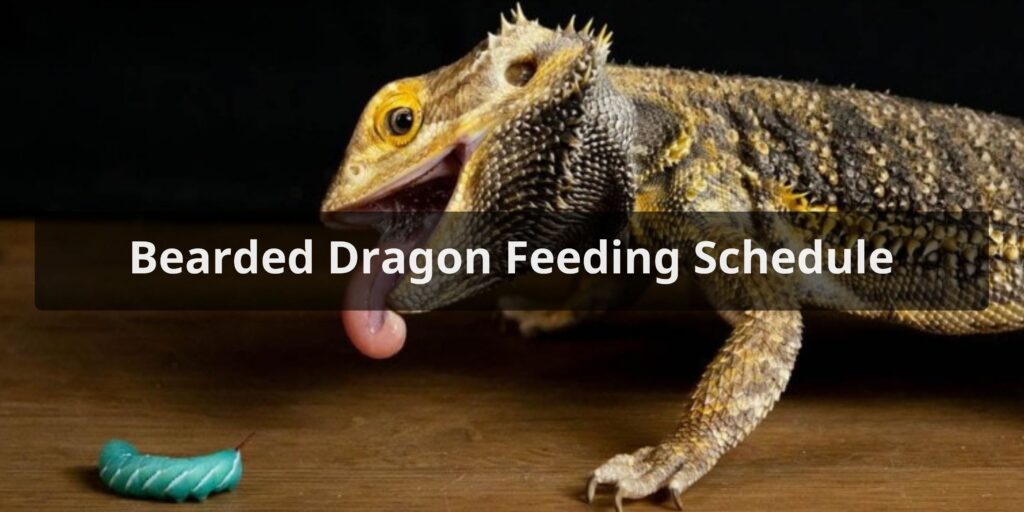Bearded dragons make wonderful pets for reptile enthusiasts of all experience levels. However, caring properly for these docile lizards does require dedication and attention to detail. One of the most important aspects of bearded dragon ownership is following the proper feeding schedule. Establishing a routine schedule and diet is crucial for your bearded dragon’s health and wellbeing. In this guide, we will explore everything you need to know about crafting the ideal bearded dragon feeding schedule.
Importance of Feeding Schedules

Following a consistent feeding schedule is vital for all pet reptiles, including bearded dragons. In the wild, bearded dragons have adapted to hunt for food during certain times of day when their prey is active. Replicating this natural cycle helps your pet feel comfortable and minimizes stress. Additionally, scheduled feedings allow you to carefully monitor your bearded dragon’s appetite and food intake. This helps ensure they are eating the proper amount and nutrients. An inconsistent feeding routine can lead to over- or under-eating, obesity, and vitamin deficiencies. Establishing a schedule provides structure and allows your bearded dragon’s body to acclimate.
Factors to Consider
When designing a feeding schedule for your bearded dragon, there are several key factors to keep in mind:
Age
Younger, growing bearded dragons need to be fed more frequently than adult lizards. Baby bearded dragons should be fed 2-3 times per day, while juvenile and adult bearded dragons only need one feeding daily. Adjusting feedings based on life stage is crucial.
Breeding/Egg-Laying
If you have a female bearded dragon, her feeding needs will change if she is gravid (carrying eggs) or laying eggs. During this time, increase feedings to 2-3 times daily to support her higher caloric needs.
Seasons
Some owners opt to slightly reduce feedings for adult bearded dragons during cooler winter months when appetite decreases. Monitor your bearded dragon and adjust if needed.
Health Issues
If your bearded dragon is ill or recovering from health problems, they may need adjusted feeding frequency or food types. Consult an exotic veterinarian for advice tailored to your pet’s needs.
Sample Feeding Schedules
Here are sample bearded dragon feeding schedules broken down by age:
Baby (0-4 months):
- 2-3x daily
- Offer 50-60 appropriately sized feeder insects per feeding
- Provide fresh salad of chopped greens daily
Juvenile (4-18 months):
- 2x daily
- Offer 30-40 appropriately sized feeder insects per feeding
- Provide fresh salad of chopped greens daily
Adult (18+ months):
- 1x daily
- Offer 15-20 appropriately sized feeder insects
- Provide fresh salad of chopped greens daily
Feeding Tips
- Remove uneaten insects and salad within 15-20 minutes after each feeding to prevent biting or stress to your bearded dragon.
- Offer food at consistent times each day whenever possible. Most owners recommend morning and late afternoon/early evening feedings.
- Use shallow feeding dishes your bearded dragon can easily access.
- Dust insects with calcium supplement 1-2x weekly and multivitamin 1x weekly.
- Salad can include collard greens, mustard greens, turnip greens, endive, squash, bell peppers, carrots, and berries. Rotate ingredients for variety.
- Appropriate feeder insects include crickets, dubia roaches, black soldier fly larvae, silkworms, and locusts. Avoid mealworms which are high in fat.
- Always provide fresh, filtered water in a shallow bowl that is cleaned and refilled daily.
Conclusion
Creating and sticking to a well-researched bearded dragon feeding schedule is one of the most vital aspects of caring for these personable lizards. It promotes proper growth, nutrition, and health. Be sure to take your pet’s age, life stage, and seasonal needs into account when designing a schedule. With a little preparation and care, you can give your bearded dragon the healthy, happy life they deserve. Let your bearded dragon’s appetite and behavior guide any adjustments along the way. Consistency is key, as is providing a balanced diet rich in essential vitamins, minerals, and nutrients.
FAQs About Bearded Dragon Feeding Schedule
What is the recommended feeding schedule for a bearded dragon?
The recommended feeding schedule for adult bearded dragons is typically once a day, while juveniles may require two or three meals daily. It’s crucial to offer a balanced diet of live insects, leafy greens, and occasional fruits. Monitor their appetite and adjust the schedule accordingly.
How often should I feed my juvenile bearded dragon?
Juvenile bearded dragons are growing rapidly and usually need to be fed two to three times a day. Offer a variety of appropriately sized insects and fresh greens to support their growth and development.
What is the feeding schedule for an adult bearded dragon?
Adult bearded dragons can thrive on a once-a-day feeding schedule. Provide a mix of insects and vegetables to maintain their health. Adjust the portion size to prevent overfeeding and obesity.
Do bearded dragons have different feeding schedules based on age?
Yes, bearded dragons have varying feeding schedules based on age. Juveniles require more frequent meals due to their growth rate, while adults can be fed once daily. Adjustments should be made to meet their changing nutritional needs.
Can I feed my bearded dragon on a fixed daily schedule?
Feeding your bearded dragon on a fixed daily schedule is generally acceptable, especially for adults. However, it’s essential to remain flexible and observe their appetite. Some individuals may have preferences or exhibit variations in hunger levels, so monitor their behavior and adjust the schedule if needed.




